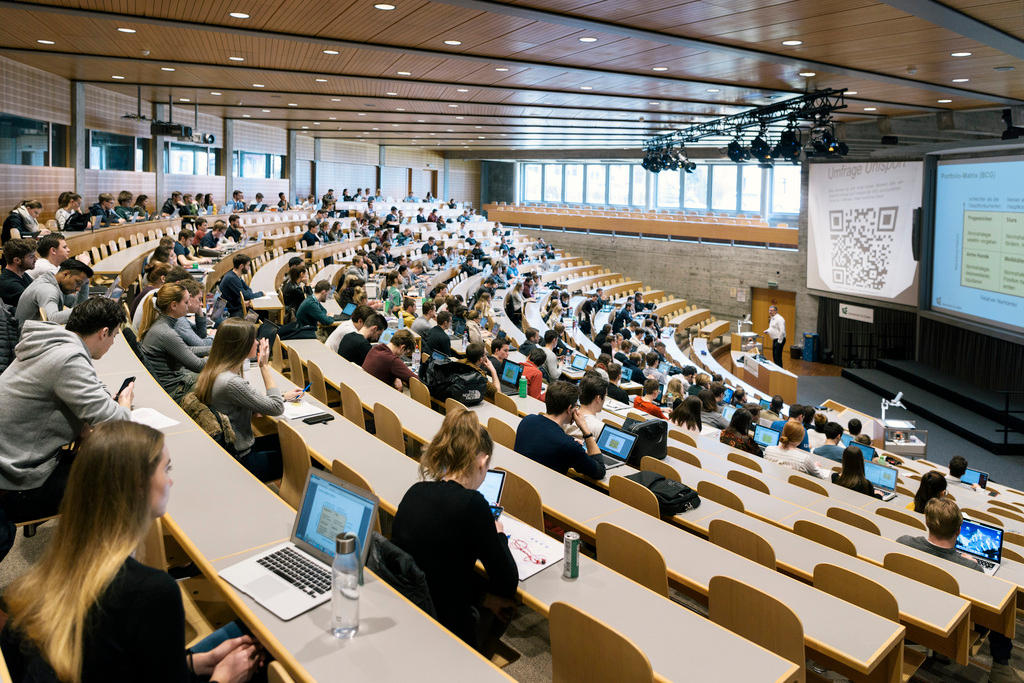How does Switzerland compare when it comes to university tuition fees?

The US and UK are the top destinations for international students looking to study abroad. Can relatively low tuition fees help Switzerland give them a run for their money?
This June, swissinfo.ch asked readers what they would like to know about the university system in the US, UK and Switzerland. Our correspondents in these three countries then set about finding the answers. Here is what they were able to dig up about tuition fees:
For the 2016/2017 school year, students from India and China made up about 50% of all international students in the USExternal link. The bulk of them were from China, but the growth of Indian students is outpacing those from China. These students are largely attracted to graduate-level, and practical training programs. Some universities target Indian students directly, like Arizona State UniversityExternal link that offers fast-facts about its degree programs, or even the prevalence of Hinduism in the state.
American universities tend to like international students because they can charge them steeper fees than domestic students. If you look at undergraduate programs for the University of Iowa, for example, an international engineering student External linkwould spend nearly $31,000 just for tuition, and when you add living expenses, books, and other fees, the total estimated cost is more than $45,000. Compare that to estimates for undergraduate Iowa residentsExternal link who would spend about $24,000.
Higher education in the UK is, by all accounts, also an expensive affair, whether at undergraduate or postgraduate level. In both cases, international students must pay high tuition fees. For “Home” students (residents and nationals from Europe), undergraduate degrees last three or four years and generally cost £9,250 (all figures calculated pro rata), regardless of their chosen subject. According to the Reddin Survey of University Tuition Fees 2017-18,External link “overseas” or international students can expect fees ranging from £9,250 ($11,908) to £34,000, which does depend on the course they study.
At postgraduate level, British universities are more or less at liberty to choose how much to charge for their courses. They are not standardised as they are for undergraduate courses. In consequence, tuition fees for both home and overseas students vary according to subject, institution, and length of study.
The chosen subject is the first variable that determines one’s tuition fees in the UK. Humanities and Social Sciences, such as History, Economics, and Law, tend to be cheaper and the study length shorter than most science subjects, and cost between £10,000 and £21,000. Science, engineering, or clinical subjects, which include chemistry, physics, computer science, medicine, and dentistry, are much more expensive as they require specialised equipment and facilities; they start at £10,000 and can rise to up to £43,000.
The main factor responsible for this divergent spectrum is the institution at which one studies. An MSc in Mechanical Engineering from the University of Leeds, for example, costs £21,500; an MEng from Imperial College London costs £30,250. The difference is even wider when the length of study is taken into account: the degree at Leeds only lasts one year; at Imperial, the degree is four years long.
“I would like to know the average tuition fees in Switzerland to pursue a masters degree in a technical domain,” Abhishek.
The good news, as far as expensive Switzerland is concerned, is that tuition fees are relatively low, thanks to high per capita expenditure on educationExternal link. As publicly funded universities, two of the country’s best-ranked schools for science and engineering – the Federal Institutes of Technology Lausanne (EPFLExternal link) and Zurich (ETHZExternal link) – are also among the most affordable, charging no more than CHF650 (USD653) per semester,External link regardless of students’ place of origin. Some universities have slightly higher fees for non-Swiss students, though only a few at the top-end of the scale, like the University of St. GallenExternal link (known for its business studies), charge them at least double the amount (CHF3,326 per semester at the master’s level).
Fees typically cover enrollment in all coursesExternal link and nominal contributions to associations like student unions. They don’t include books and other course material or accommodation.
“Do I qualify for any scholarships being an international student?,” Rachel.
Scholarships
While tuition fees in Switzerland are modest the bad news is that the high cost of living tend to offset any savings. Luckily, foreign students have access to some financial help. The Swiss government awards scholarshipsExternal link to researchers who already hold a master’s degree and want to pursue research or doctoral studies in Switzerland. But beware that candidates should apply only through Swiss embassies and consulates abroad: similar awards being offered by email or on social media are likely fraudulent.
Individual schools also have their own scholarships. At ETHZ, for instance, international master’s students who did not earn their bachelor’s degree at the institute are eligible for awardsExternal link after completing their second semester. And the institute’s Excellence and Master Scholarship ProgrammesExternal link are open to both Swiss and international applicants to a master’s study and range in value from CHF1,500 to CHF 11,000 per semester.

More
A visual summary of university rankings
Foundations and cantons also offer scholarships and in some cases, foreign students are eligible to apply. The canton of VaudExternal link, home of the EPFL and the University of LausanneExternal link, offers awards to students from the EU-EFTA area and to nationals of countries with which Switzerland has signed international agreements, as long as students make their residence in the canton. Awards through foundations are more restrictive, being often subject- or degree-specific and open only to Swiss students or those from a specific country or region. The best source of information on these types of awards is the admissions office of the university where students are applying to study.
The UK also offers scholarship options for international students. Although postgraduate tuition fees are as high (if not higher) than at the undergraduate level, there is also more financial support available in the form of scholarships, bursaries, and grants. But these remain comparatively rare and are highly competitive.
Once an offer has been received, your chosen university will automatically consider you for a wide selection of grants and scholarships. These are usually open to all matriculated students, but there are some scholarships that are specifically meant to help international students and for these one sometimes has to apply separately.
Other funding bodies for international students include the British Council Education UKExternal link, which also offers scholarships for Indian students as part of its UK’s GreatExternal link campaign. The British Foreign Office also awards the Chevening ScholarshipsExternal link and Commonwealth ScholarshipsExternal link on the basis of academic achievement and leadership potential. The ScottishExternal link and WelshExternal link governments issue similar grants. These, like all forms of financial support, are highly selective and highly competitive.
There are some scholarships available for international studentsExternal link in the US, and many of them are tied to academic performance, sometimes financial need, or other criteria. Competition may be fierce for some programs, but if a university wants a student, there are incentives they can offer. A few years ago, this even led some Indian students to seek the Ivy LeagueExternal link as refuge from denial in Indian universities.
There is still great potential and opportunity for international students in American universities, but there are many things to consider including cost, field of study, and even whether a job or visa will be possible after graduation. We’ll be examining all this and more in this series.
This article is part of a series that compares the university system in the US, UK and Switzerland. Topics covered are based on questions sent in by swissinfo.ch readers.
Tony Ganzer is an American journalist based in Cleveland, Ohio who lived and worked in Switzerland for many years. He will help examine the American university system for this series.
Geraldine Wong Sak Hoi, a Canadian journalist based in Switzerland, will report on the Swiss university system for this series. She is also involved in fact-checking projects for swissinfo.ch.
Leo Shearmur is a postgraduate student at the University of Oxford and has lived and studied in the UK and Switzerland. He will report on the British educational system of this series.

In compliance with the JTI standards
More: SWI swissinfo.ch certified by the Journalism Trust Initiative








You can find an overview of ongoing debates with our journalists here . Please join us!
If you want to start a conversation about a topic raised in this article or want to report factual errors, email us at english@swissinfo.ch.